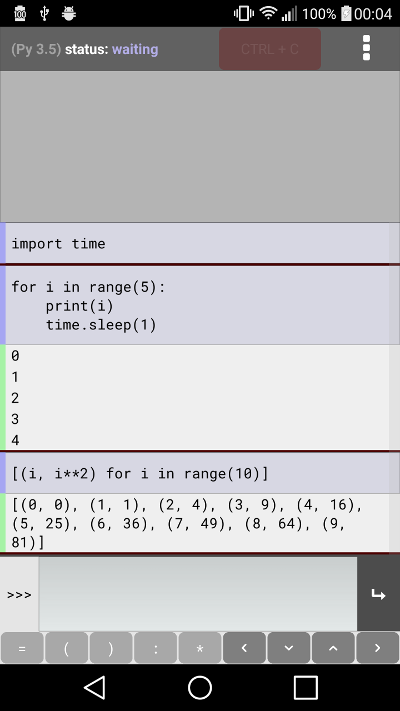A Python interpreter interface for mobile devices. Pyonic interpreter is available for Android on Google Play, for Python 2 or Python 3. The app can also be run under Kivy on the desktop (Linux, OS X/macOS, Windows).
The Pyonic interpreter user interface is created in Python using Kivy. User input is passed to a second interpreter, run as a separate process via an Android service. The interpreter is packaged for Android using python-for-android. Pyonic interpreter is written for and tested with both Python 2 and Python 3.
Future targets include support for multiple interpreters, different kinds of Python tasks (app threads, background services), and editing/running Python files.
This app should in principle run on iOS with the addition of backend code to start the interpreter subprocess (although I don't know what the appropriate iOS mechanism would be). If anyone would like to try this, feel free to ask any questions about the process.
To run on a desktop, simply clone from github and run python
pyonic/main.py from the cloned dir. You will need Kivy and argparse
installed, but other dependencies are fairly minimal.
Installing with setup.py may work, but this hasn't been tested and this doesn't yet install a command line shortcut.
To build for Android, install python-for-android, modify the hardcoded
ndk-dir in setup.py, and run:
python setup.py apk
You may need to install python-for-android from the github master branch for this to work.
Pyonic interpreter runs as a Kivy application, starting a second process in the background (a subprocess on desktop, a service on Android) to run the Python code input. The output streams of this second process are redirected to be formatted in Kivy labels in the main app.
This method seems quite crude, although it works well. An immediate improvement will be to check how other similar projects do the same thing.
Communication between processes is achieved using osc (specifically, the implementation shipped with Kivy). There are probably much better ways to do this nowadays, such as zeromq. These will be investigated in the future.
- Editor:
- code completion
- linting?
- run code (different screen?)
- abstract InterpreterInput and MenuButton for both usages
- multiple file support (navigation drawer?)
Before next release:
- Near future:
- Add optional button rows (numbers, more symbols)
- Improve message if interpreter is not responding on resume
- Make initialising logo appear before unpacking
- Check out keyboard issues
- Unify handling of python2/python3 differences via a module
- Eventually:
- Halt thread on service exit
- Save to file button
- Add an 'About' page
- Setting for scrollback length
- Add linting
Works on:
- LG G4 (Android 6.0)
- Moto E (Android 6.0)
Fails on:
- Nexus 4
- Galaxy Note 2
- Sony xperia z1 compact
- Samsung Galaxy J1 (Android 5.1.1)
http://allview.ro/a4-you.html (A4 You)
